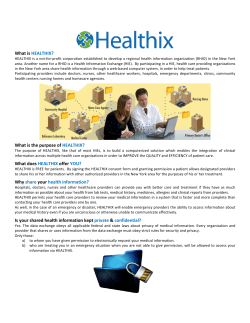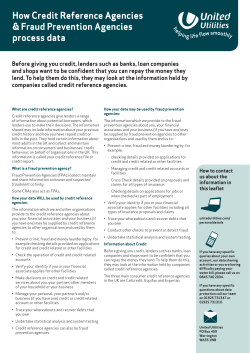
Home Depot Breach Reminds Consumers about Watching Credit Report
OCTOBER 2014 ACCEL MEMBERS FINANCIAL COUNSELING Home Depot Breach Reminds Consumers about Watching Credit Report As home-improvement giant The Home Depot becomes the latest big-box retailer to announce data theft (following on the heels of Target and Michael’s Arts & Crafts), Accel offers a reminder about the steps you need to take, if you become a victim of identity theft. 1. Place a ‘fraud alert’ on your credit reports, and check your credit reports regularly through www.annualcreditreport.com. Fraud alerts can help prevent an identity thief from opening any more accounts in your name. Contact the toll-free fraud number of any of the three consumer reporting companies below or visit their websites (you only need to contact one of the three companies to place an alert on all three). TransUnion: 1-800-680-7289; www.transunion.com Equifax: 1-800-525-6285; www.equifax.com Experian: 1-888-EXPERIAN (397-3742); www.experian.com 2. Close any accounts that you believe have been tampered with or opened fraudulently. Call and speak with someone in the security or fraud department of each company. Follow up in writing, and include copies (NOT originals) of supporting documents. Send your letters by certified mail, return receipt requested, so you can document what the company received and when. Keep a file of everything you send and a record of every conversation. (438-4338); TTY: 1-866-653-4261. Be sure to call the Hotline to update your complaint if you have any additional information or problems. 4. File a report with your local police or the police in the community where the identity theft took place. Call and ask them if you need to file the report in person or if you can do it over the phone or on the internet. When you file your report, bring or attach a copy of your FTC ID Theft Complaint form and any supporting documentation. Ask the officer to attach or incorporate the ID Theft Complaint into their police report. The FTC ID Theft Complaint, along with the police report, can constitute what is known as an ‘Identity Theft Report’. This Identity Theft Report can be used to (1) permanently block fraudulent information from appearing on your credit report; (2) ensure that debts do not reappear on your credit report; (3) prevent a company from continuing to collect debts that result from identity theft; and (4) place an extended fraud alert on your credit report. 3. File a complaint with the Federal Trade Commission. You can do this on their website https://www.ftccomplaintassistant.gov/ or by calling the FTC’s Identity Theft Hotline 1-877-ID-THEFT WWW.ACCELSERVICES.ORG | 1-877-33-ACCEL Check Your Credit Report Before the Holidays Did you know that, each year, you can get a free credit report from each of the three major reporting bureaus? If you haven’t requested any this year, now is the time to pull reports from Experian, TransUnion and Equifax. “It’s important to check to see if there has been any suspicious activity with your accounts,” said Katie Moore, Accel counselor. “The upcoming holiday season is a very busy time when it comes to using credit cards. If you don’t track your credit, you could be in for a surprise when you start gift shopping.” To pull your credit reports, log on to www.annualcreditreport.com. You can also access GreenPath’s support materials to help you read and understand your credit report by logging on to www.accelservices.org and searching “credit report.” Home Equity Loans are Returning By Mark Munzenberger, GreenPath/Accel Housing Director Nearly every state across the country is experiencing increases in home values. On average, about 10 percent, but in some cities and states, closer to a 20 percent increase. The increase in home values is opening up the door for some homeowners to tap into that equity in the form of a Home Equity Loan or Line of Credit. However, as with nearly every financial product out there, there are pros and cons for homeowners to consider as they decide whether or not to borrow against their home. The positives: • The interest rates on these loans are typically lower than unsecured credit cards or other personal loans. Also, the application fees are minimal – significantly less than a full-fledged refinance. • The interest paid on these loans may be tax deductible. Consult a tax advisor for further advice. • The money can be used for anything – home improvements, debt consolidation, college tuition, etc. • Lines of credit are available for you to use only. As a member of Zeal Credit Union, you can take advantage of the Accel, a program of GreenPath, Inc. Accel is a free financial education and counseling service. For more information, call 1-877-33ACCEL (332-2235) or visit us on the web at www.accelservices.org. So what to do if you find fraudulent activities on your credit report? “If you find an error, you may dispute it online through the main credit reporting agencies,” said Moore. “You also can call the telephone number on your credit report for assistance, if you feel any information is inaccurate or incomplete.” “You’ll need to be specific, by including the account number of an item you feel is in error and explain exactly why you feel it is inaccurate,” continued Moore. “Simply saying an item is wrong does not give enough detail to help resolve the issue. “Investigations of disputed items can take up to 45 days, so if you pull your reports in October, you should be in good shape by the holidays,” Moore concluded. The negatives: • It’s very easy to get into financial trouble. Consumers who use these loans for regular, everyday expenses (like using an ATM) will undoubtedly find themselves in trouble with excessive debt. • Home values fluctuate, and a decrease in your home value will increase the probability that you may suddenly be underwater. This happens when you owe more on your mortgage(s) than what the market value of the property is worth. • Because this loan is secured by the home, homeowners who fall delinquent on either their primary or secondary home equity loan are at risk of foreclosure. • The goal should be to reduce the amount the amount of debt you carry, not increase it. A home is usually an individual’s most valuable asset, and building equity in the property is a sound financial strategy. If you’re interested in learning if a home equity loan might be right for you, a good first step would be to conduct a housing counseling session with an Accel housing counselor. For more information, log on to www.accelservices.org and click on the orange “housing services” link on the front page.
© Copyright 2025





















